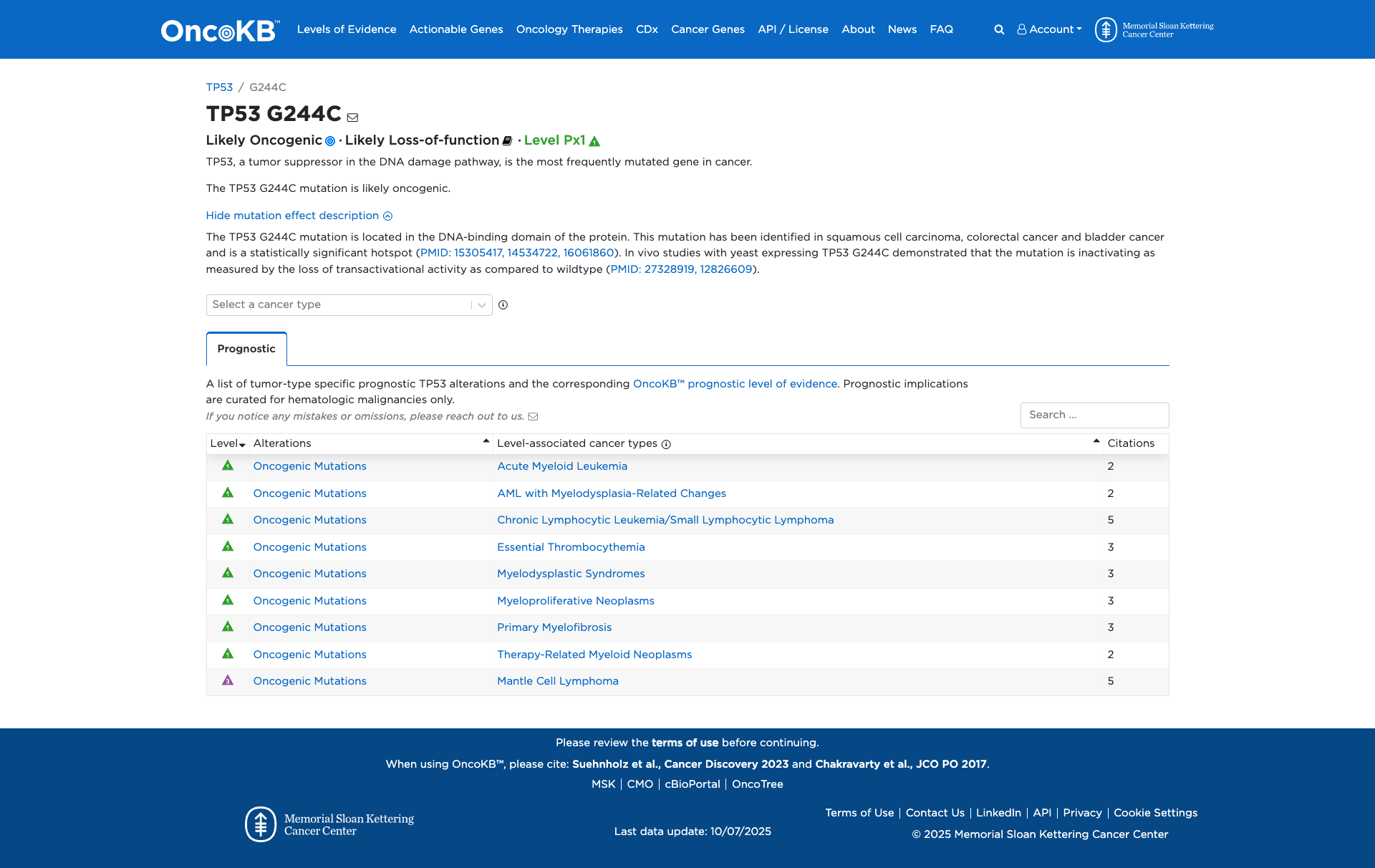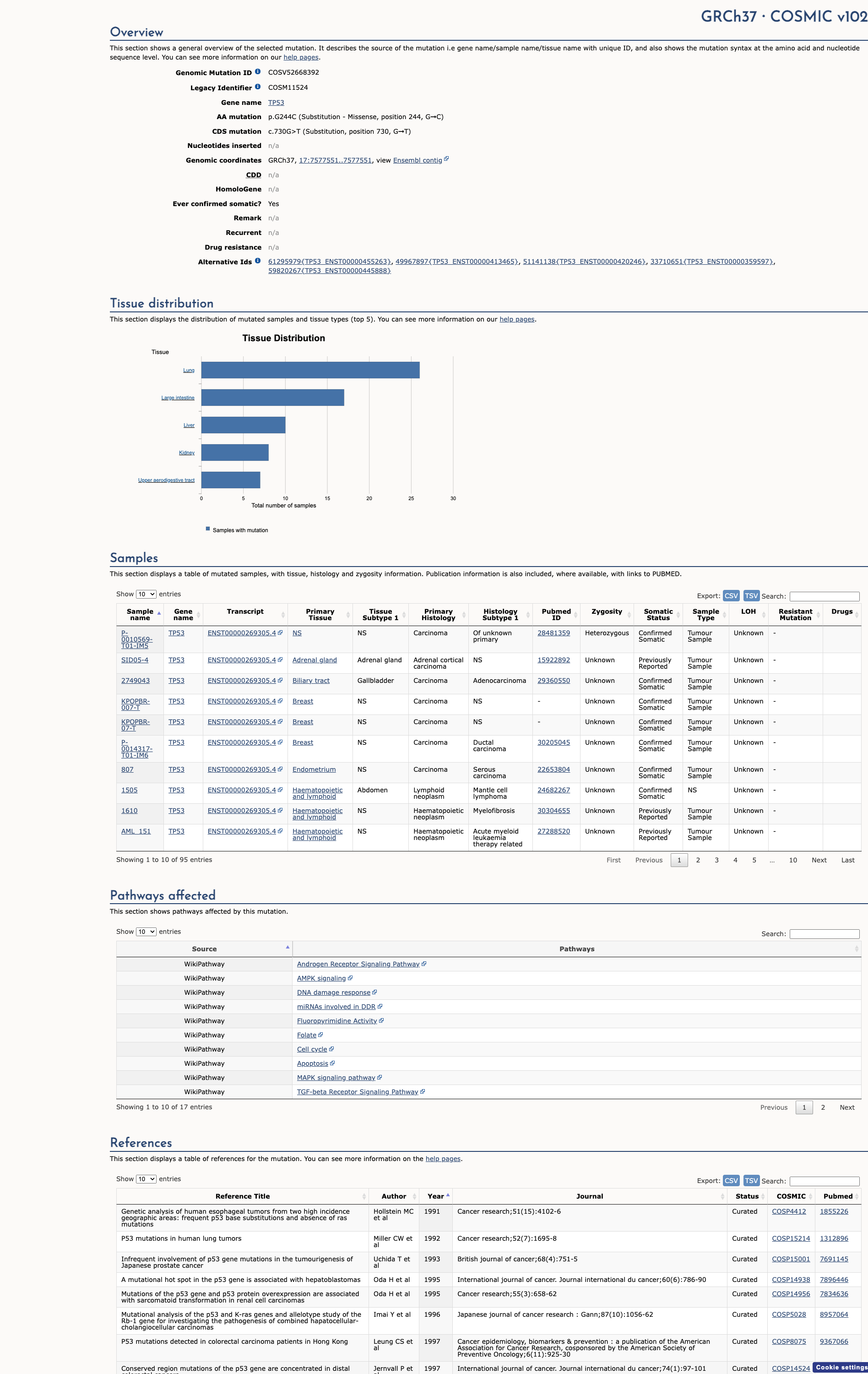TP53 c.730G>T, p.Gly244Cys
NM_000546.6:c.730G>T
COSMIC ID: COSM11524, COSM99685
Pathogenic
Per TP53 VCEP-specific guidelines, only PM2_Supporting is met (absent from large population databases). No functional, segregation, hotspot, or computational criteria per VCEP could be applied, resulting in a classification of Variant of Uncertain Significance (VUS).
ACMG/AMP Criteria Applied
PM2
Genetic Information
Gene & Transcript Details
Gene
TP53
Transcript
NM_000546.6
MANE Select
Total Exons
11
Strand
Reverse (−)
Reference Sequence
NC_000017.10
Alternative Transcripts
| ID | Status | Details |
|---|---|---|
| NM_000546.5 | RefSeq Select | 11 exons | Reverse |
| NM_000546.3 | Alternative | 11 exons | Reverse |
| NM_000546.4 | Alternative | 11 exons | Reverse |
| NM_000546.2 | Alternative | 11 exons | Reverse |
Variant Details
HGVS Notation
NM_000546.6:c.730G>T
Protein Change
G244C
Location
Exon 7
(Exon 7 of 11)
5'Exon Structure (11 total)3'
Functional Consequence
Loss of Function
Related Variants
No evidence of other pathogenic variants at position 244 in gene TP53
Alternate Identifiers
COSM11524, COSM99685
Variant interpretation based on transcript NM_000546.6
Genome Browser
Loading genome browser...
HGVS InputNM_000546:c.730G>T
Active Tracks
ConservationRefSeqClinVargnomAD
Navigation tips: Use mouse to drag and zoom. Click on features for details.
Clinical Data
Population Frequency
Global Frequency
0.0 in 100,000
Extremely Rare
Global: 0.0%
0%
0.05%
0.1%
1%
5%
10%+
ACMG Criteria Applied
PM2
This variant is not present in gnomAD (PM2 criteria applies).
Classification
3 publications
Likely Pathogenic
Based on 4 submitter reviews in ClinVar
Submitter Breakdown
2 Path
1 LP
1 VUS
Pathogenic
Likely Path.
VUS
Likely Benign
Benign
Publications (3)
This sequence change replaces glycine, which is neutral and non-polar, with cysteine, which is neutral and slightly polar, at codon 244 of the TP53 protein (p.Gly244Cys). This variant is not present in population databases (gnomAD no frequency). This variant has not been reported in the literature in individuals affected with TP53-related conditions. ClinVar contains an entry for this variant (Variation ID: 376599). Advanced modeling performed at Invitae incorporating data from internal and/or published experimental studies (PMID: 12826609, 29979965, 30224644) indicates that this missense variant is expected to disrupt TP53 function with a positive predictive value of 97.5%. Experimental studies have shown that this missense change affects TP53 function (PMID: 12826609, 29979965). In summary, the available evidence is currently insufficient to determine the role of this variant in disease. Therefore, it has been classified as a Variant of Uncertain Significance.
Clinical Statement
This variant has been reported in ClinVar as Pathogenic (2 clinical laboratories) and as Uncertain significance (1 clinical laboratories) and as Likely pathogenic (1 clinical laboratories).
COSMIC ID
COSM11524, COSM99685
Recurrence
94 occurrences
PM1 Criteria
Applied
Criterion PM1 is applied based on the high recurrence in COSMIC database.
COSMIC Database Preview
Accessing full COSMIC database details requires institutional login or subscription. External links may prompt for authentication.
Functional Impact
Functional Domain
Hotspot Status
Hotspot
PM1
Mutation Count
520
Reported mutations in this domain
050100+
Domain Summary
This variant is located in a mutational hotspot or critical domain (520 mutations).
PM1 criterion applied.
Related Variants in This Domain
No evidence of other pathogenic variants at position 244 in gene TP53
Functional Summary
Loss-of-Function
The TP53 G244C variant has been functionally characterized as inactivating, as demonstrated by in vivo studies in yeast showing a loss of transactivational activity compared to the wildtype. This suggests a likely loss-of-function effect.
Database Previews
OncoKB

JAX-CKB

Click on previews to view full database entries. External databases may require institutional access.
Computational Analysis
Pathogenicity Predictions
REVEL Score
0.94
0.94
Likely Benign0.0
Uncertain (Low)0.2
Uncertain (Med)0.5
Likely Pathogenic0.75
REVEL scores ≥ 0.75 are strong evidence (PP3)
Predictor Consensus
Unknown
PP3 Applied
Yes
VCEP Guidelines
Applied ACMG/AMP Criteria (VCEP Specific) VCEP Guidelines
PVS1
PVS1 (Not Applied) Strength Modified
According to VCEP TP53-specific guidelines, PVS1 applies to null variants (nonsense, frameshift, canonical splice) leading to NMD. The evidence for this variant shows: a missense change (G244C). Therefore, this criterion is not applied because the variant type does not meet PVS1 requirements.
PS1
PS1 (Not Applied) Strength Modified
According to VCEP TP53-specific guidelines, PS1 applies when a different nucleotide change results in the same amino acid change as a previously established pathogenic variant. The evidence for this variant shows: no other nucleotide change at codon 244 known to be pathogenic. Therefore, this criterion is not applied.
PS2
PS2 (Not Applied) Strength Modified
According to VCEP TP53-specific guidelines, PS2 requires confirmed de novo occurrence with points. The evidence for this variant shows: no de novo data available. Therefore, this criterion is not applied.
PS3
PS3 (Not Applied) Strength Modified
According to VCEP TP53-specific guidelines, PS3 requires non-functional on Kato et al. assay AND loss of function on a second assay for Strong, or specified combinations for Moderate/Supporting. The evidence for this variant shows: loss of transactivation in a yeast assay (Kato) but no second assay data. Therefore, this criterion is not applied because the evidence does not meet the multi-assay requirement.
PS4
PS4 (Not Applied) Strength Modified
According to VCEP TP53-specific guidelines, PS4 requires statistical enrichment with proband points. The evidence for this variant shows: no case–control or proband point data. Therefore, this criterion is not applied.
PM1
PM1 (Not Applied) Strength Modified
According to VCEP TP53-specific guidelines, PM1 applies at Moderate strength for missense variants in codons 175, 245, 248, 249, 273, or 282. The evidence for this variant shows: codon 244, not listed. Therefore, this criterion is not applied.
PM2
PM2 (Supporting) Strength Modified
According to VCEP TP53-specific guidelines, the rule for PM2_Supporting is: 'This rule should be applied at supporting level for allele frequency <0.00003 in gnomAD.' The evidence for this variant shows: absent from gnomAD. Therefore, PM2 is applied at Supporting strength because the variant is absent in population databases.
PM3
PM3 (Not Applied) Strength Modified
According to standard ACMG guidelines, PM3 applies to recessive disorders with variants in trans with a pathogenic variant. The evidence for this variant shows: TP53 is dominant and no in trans data. Therefore, this criterion is not applied.
PM4
PM4 (Not Applied) Strength Modified
According to standard ACMG guidelines, PM4 applies to protein length changes (in-frame indels). The evidence for this variant shows: a missense change with no length alteration. Therefore, this criterion is not applied.
PM5
PM5 (Not Applied) Strength Modified
According to VCEP TP53-specific guidelines, PM5 applies when ≥2 different missense changes at the same residue are pathogenic (Strong) or 1 is pathogenic (Moderate). The evidence for this variant shows: no other pathogenic missense reported at codon 244. Therefore, this criterion is not applied.
PM6
PM6 (Not Applied) Strength Modified
According to standard ACMG guidelines, PM6 applies to presumed de novo variants without confirmation. The evidence for this variant shows: no de novo data. Therefore, this criterion is not applied.
PP1
PP1 (Not Applied) Strength Modified
According to VCEP TP53-specific guidelines, PP1 requires cosegregation data across meiotic events. The evidence for this variant shows: no family segregation data. Therefore, this criterion is not applied.
PP2
PP2 (Not Applied) Strength Modified
According to standard ACMG guidelines, PP2 applies when missense variants are common in a gene with low benign missense variation. TP53 does not meet this criterion. Therefore, this criterion is not applied.
PP3
PP3 (Not Applied) Strength Modified
According to VCEP TP53-specific guidelines, PP3 requires BayesDel or aGVGD scores per flowchart. The evidence for this variant shows: only a REVEL score, no BayesDel/aGVGD. Therefore, this criterion is not applied.
PP4
PP4 (Not Applied) Strength Modified
According to VCEP TP53-specific guidelines, PP4 applies when specific LFS-associated phenotype observations are present. The evidence for this variant shows: no phenotype data. Therefore, this criterion is not applied.
PP5
PP5 (Not Applied) Strength Modified
According to standard ACMG guidelines, PP5 is not recommended and applies to assertions without available evidence. The evidence for this variant shows conflicting ClinVar assertions. Therefore, this criterion is not applied.
BA1
BA1 (Not Applied) Strength Modified
According to VCEP TP53-specific guidelines, BA1 applies at Stand Alone strength for allele frequency ≥0.001. The evidence for this variant shows: absent in gnomAD. Therefore, this criterion is not applied.
BS1
BS1 (Not Applied) Strength Modified
According to VCEP TP53-specific guidelines, BS1 applies at Strong strength for allele frequency ≥0.0003. The evidence for this variant shows: absent in gnomAD. Therefore, this criterion is not applied.
BS2
BS2 (Not Applied) Strength Modified
According to VCEP TP53-specific guidelines, BS2 requires ≥2 unrelated elderly unaffected females. The evidence for this variant shows: no such data. Therefore, this criterion is not applied.
BS3
BS3 (Not Applied) Strength Modified
According to VCEP TP53-specific guidelines, BS3 requires functional evidence of no loss of function across assays. The evidence for this variant shows: loss of function in yeast. Therefore, this criterion is not applied.
BS4
BS4 (Not Applied) Strength Modified
According to VCEP TP53-specific guidelines, BS4 requires lack of segregation in affected members. The evidence for this variant shows: no segregation data. Therefore, this criterion is not applied.
BP1
BP1 (Not Applied) Strength Modified
According to standard ACMG guidelines, BP1 applies to missense variants in genes where only truncating causes disease. TP53 has pathogenic missense. Therefore, this criterion is not applied.
BP2
BP2 (Not Applied) Strength Modified
According to standard ACMG guidelines, BP2 applies to variants seen in cis/trans with pathogenic. The evidence for this variant shows: no such data. Therefore, this criterion is not applied.
BP3
BP3 (Not Applied) Strength Modified
According to standard ACMG guidelines, BP3 applies to in-frame indels in repetitive regions. The evidence for this variant shows: missense change. Therefore, this criterion is not applied.
BP4
BP4 (Not Applied) Strength Modified
According to VCEP TP53-specific guidelines, BP4 requires BayesDel <0.16 and no splicing impact. The evidence for this variant shows: only REVEL and no predicted splice effect. Therefore, this criterion is not applied.
BP5
BP5 (Not Applied) Strength Modified
According to standard ACMG guidelines, BP5 applies when variant found with alternative molecular cause. The evidence for this variant shows: no alternative cause. Therefore, this criterion is not applied.
BP6
BP6 (Not Applied) Strength Modified
According to standard ACMG guidelines, BP6 applies to benign assertions without evidence. The evidence for this variant shows: no such reliable benign assertion. Therefore, this criterion is not applied.
BP7
BP7 (Not Applied) Strength Modified
According to VCEP TP53-specific guidelines, BP7 applies to synonymous variants with no splice impact. The evidence for this variant shows: missense change. Therefore, this criterion is not applied.

